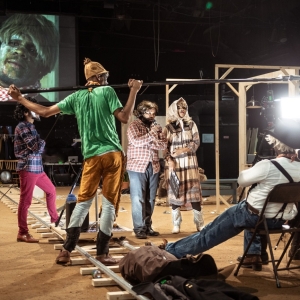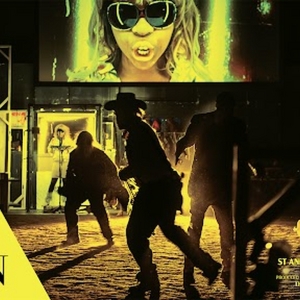Fix + Foxy's Dark Noon 2024
Opened: June 7, 2024Closing: July 07, 2024
Fix + Foxy's Dark Noon - 2024 Off-Broadway History , Info & More
St. Ann's Warehouse
45 Water St. Brooklyn, NY 11201
Fix + Foxy’s Dark Noon (June 7 - July 7, 2024) took the 2023 Edinburgh Festival Fringe by storm. In it, South African artists including co-director and choreographer Nhlanhla Mahlangu and seven South African actors join forces with acclaimed Danish director Tue Biering and create an exhilarating theatrical experience. Dark Noon turns the myth of the American Wild West, as endlessly glorified by Hollywood westerns of the 1950s, on its head. This time, rather than history being told by the victors, it is told by the vanquished. On a vast bare stage, the skeleton film set of a Western town emerges in real time. The extraordinary actors embody the distinctive characters of America’s past: cowboys, gold seekers, missionaries, enslaved Africans, Chinese workers, Native Americans, prostitutes, Bluecoats, and Confederates. Through playful interpretation, the performers scrutinize the presumptions and misconceptions of the American Frontier. “Dripping with energy, irony and anger,” this “savage and gripping” work “tells the 300-year history of the American west in 100 uproarious minutes” (The Guardian).
FEATURED REVIEWS FOR Fix + Foxy's Dark Noon
Review: In ‘Dark Noon,’ American History Is a Shoot-’Em-Up Western
7 / 10
Even if you buy that argument, your tolerance for its expression may be greater than mine. I don’t feel improved, enlightened or even chastened by a furious man repeatedly cracking a bullwhip in my direction. Nor was I amused by the dragooning of theatergoers brought onstage to witness atrocities or, at another point, to be turned, without warning, into slaves at an auction. The close-ups of their faces, as they crumple or freeze in the act of realization, are devastating, and not just for those undersold at $1. The devastation is of course the point. Everything “Dark Noon” chooses to explore figuratively was once quite literal to its victims. That there were millions of those victims lends moral importance to the endeavor — all the more reason it must be done well. But the play’s format seems to have gotten away from its values, creating a disturbing symbolic alliance between the storytellers and the perpetrators. It is no longer a representation of cruelty; it is cruel.
Off-Broadway Review: DARK NOON (St. Ann’s Warehouse)
7 / 10
The audience is seated on three-sides of a bare stage, but Johan Kølkjær’s setting won’t remain empty for long. Representing America, the sets are gradually built upon a dirty tarp as the performance progresses. A church will be constructed, as well as a merchant store, a bank, a politician’s office, a pioneer home, a Chinese restaurant, a bar and whorehouse, a jail, and an outdoor holding pen. Oh, and a railroad track runs down the center of the stage ending at the mines. Plus, the endless props by Marie Rosendahl Chemnitz, cameras displaying live filming of scenes as they take place (video designer Rasmus Kreiner), and microphones (sound designer Ditlev Brinth). By the end, there’s so much scenery that other spectators disappear from view. Stage Manager Svante Huniche Corell and his crew notably uphold the challenging staging, allowing the pandemonium to unfold with perfection
Fix + Foxy's Dark Noon History
Other Productions of Fix + Foxy's Dark Noon
| 2024 | Off-Broadway |
St. Ann's Warehouse Off-Broadway Production Off-Broadway |
Videos



